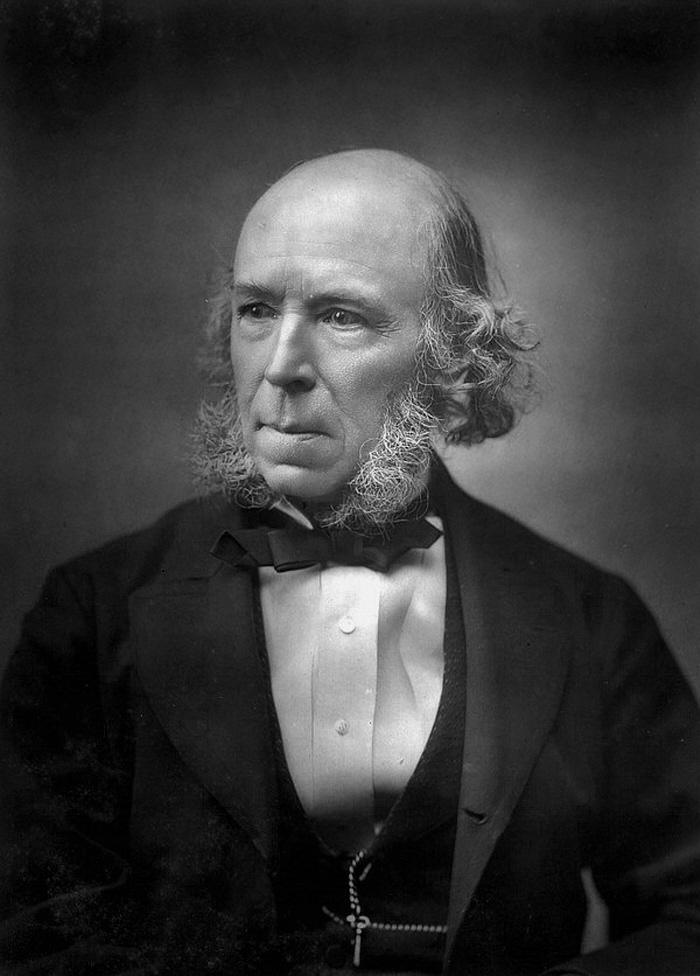Herbert Spencer nejznámější citáty
Herbert Spencer citáty a výroky
Zdroj: Messner, Reinhold, Reinhold Messner, Červená světlice na Nanga Parbatu, Brána, Praha, 2010, 1, 285, 257, 978-80-7243-439-8, Jaroslav Voříšek
Herbert Spencer: Citáty anglicky
The Principles of Biology, Vol. I (1864), Part III: The Evolution of Life, Ch. 7: Indirect Equilibration
Principles of Biology (1864)
Kontext: It cannot but happen that those individuals whose functions are most out of equilibrium with the modified aggregate of external forces, will be those to die; and that those will survive whose functions happen to be most nearly in equilibrium with the modified aggregate of external forces.
But this survival of the fittest, implies multiplication of the fittest. Out of the fittest thus multiplied, there will, as before, be an overthrowing of the moving equilibrium wherever it presents the least opposing force to the new incident force.
“The ultimate result of shielding men from the effects of folly, is to fill the world with fools.”
Vol. 3, Ch. IX, State-Tamperings with Money and Banks
Essays: Scientific, Political, and Speculative (1891)
Vol. 3, Ch. XV, The Americans
Essays: Scientific, Political, and Speculative (1891)
On Manners and Fashion
Essays on Education (1861)
Vol. 3, Ch. XV, The Americans
Essays: Scientific, Political, and Speculative (1891)
“Opinion is ultimately determined by the feelings, and not by the intellect.”
Pt. IV, Ch. 30 : General Considerations
Social Statics (1851)
“The saying that beauty is but skin deep is but a skin-deep saying.”
Vol. 2, Ch. XIV, Personal Beauty
Essays: Scientific, Political, and Speculative (1891)
Vol. 3, Ch. VII, Over-Legislation
Essays: Scientific, Political, and Speculative (1891)
"Patriotism", p. 126 http://books.google.com/books?id=zBQRAAAAYAAJ&pg=PA126
Facts and Comments (1902)
Zdroj: The Principles of Ethics (1897), Part I: The Data of Ethics, Ch. 7, The Psychological View
Pt. II, The Knowable; Ch. XIV, Summary and Conclusion
First Principles (1862)
Vol. I, Part III, Ch. 2 General Aspects of the Special-Creation-Hypothesis
Principles of Biology (1864)
Pt. II, Ch. 4 : Derivation of a First Principle, § 4
Social Statics (1851)
Pt. II, Ch. 4 : Derivation of a First Principle, § 3
Social Statics (1851)
The Development Hypothesis (1852)
Pt. I, The Unknowable; Ch. I, Religion and Science; quoting from "There is some soul of goodness in things evil / Would men observingly distil it out", William Shakespeare, Henry V, act iv. sc. i
First Principles (1862)
“Every pleasure raises the tide of life; every pain lowers the tide of life.”
Zdroj: The Principles of Ethics (1897), Part I: The Data of Ethics, Ch. 6, The Biological View
“How often misused words generate misleading thoughts!”
Zdroj: The Principles of Ethics (1897), Part II: The Inductions of Ethics, Ch. 8, Humanity
Education: What Knowledge Is of Most Worth?
Essays on Education (1861)
“Morality knows nothing of geographical boundaries, or distinctions of race.”
Pt. IV, Ch. 30 : General Considerations
Social Statics (1851)
The Development Hypothesis (1852)
Pt. III, Ch. 19 : The Right to Ignore the State, § 1 http://oll.libertyfund.org/titles/273#lf0331_label_200
Social Statics (1851)
Kontext: As a corollary to the proposition that all institutions must be subordinated to the law of equal freedom, we cannot choose but admit the right of the citizen to adopt a condition of voluntary outlawry. If every man has freedom to do all that he wills, provided he infringes not the equal freedom of any other man, then he is free to drop connection with the state — to relinquish its protection, and to refuse paying towards its support. It is self-evident that in so behaving he in no way trenches upon the liberty of others; for his position is a passive one; and whilst passive he cannot become an aggressor. It is equally selfevident that he cannot be compelled to continue one of a political corporation, without a breach of the moral law, seeing that citizenship involves payment of taxes; and the taking away of a man’s property against his will, is an infringement of his rights. Government being simply an agent employed in common by a number of individuals to secure to them certain advantages, the very nature of the connection implies that it is for each to say whether he will employ such an agent or not. If any one of them determines to ignore this mutual-safety confederation, nothing can be said except that he loses all claim to its good offices, and exposes himself to the danger of maltreatment — a thing he is quite at liberty to do if he likes. He cannot be coerced into political combination without a breach of the law of equal freedom; he can withdraw from it without committing any such breach; and he has therefore a right so to withdraw.
Vol. 3, Ch. VII, Over-Legislation
Essays: Scientific, Political, and Speculative (1891)
“The tyranny of Mrs. Grundy is worse than any other tyranny we suffer under.”
On Manners and Fashion
Essays on Education (1861)
The Man versus the State (1884), The Coming Slavery
Zdroj: The Principles of Ethics (1897), Part I: The Data of Ethics, Ch. 8, The Sociological View
“Time: That which man is always trying to kill, but which ends in killing him.”
Definitions, as quoted in The Dictionary of Essential Quotations (1983) by Kevin Goldstein-Jackson, p. 154
Ethics (New York:1915), § 70, pp. 190-191
The Principles of Ethics (1897), Part I: The Data of Ethics
